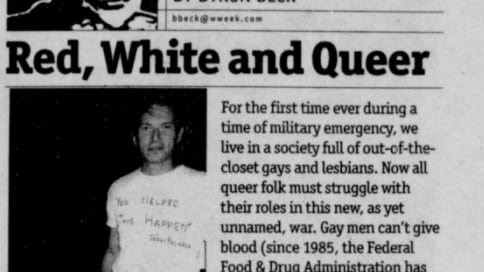From the archives: The week following the Sept. 11 attacks, WW published a number of interviews and columns about the reactions of the government, society at large and Portlanders. In the Culture section, Byron Beck’s Queer Window column waxed on a patriotic perspective, but questioned whether the U.S. would accept the street-smart ferocity the community had to offer.
For the first time ever during a time of military emergency, we live in a society full of out-of-the-closet gays and lesbians. Now all queer folk must struggle with their roles in this new, as yet P I unnamed, war. Gay men can’t give blood (since 1985, the Federal Food & Drug Administration has banned all donations from any man who has had sex with another man since 1977). Dykes can’t enlist in the armed forces (or, if they do, they can’t talk about who they are).
But we’re not helpless. And we’re more than ready to fight. That’s right. Whether anyone realizes it or not, queers have been training for something like this for decades. Crimes of hate have been the constant companion of homos since the dawn of civilization. For 20 years, queer men have found themselves in a state of war because of AIDS. We have lost thousands. And we have learned to adjust, survive and thrive—in defiance of whatever injustices the world thrusts our way.
This permanent state of emergency has created alliances so strong that entire queer villages can now mobilize at a moments notice in the name of a fallen brother or sister. Prior to last weeks horrific tragedies, however, this solidarity was largely confined to the queer community itself. Is it our job now to show others how simple it is to put aside petty differences to create a truly united front? Maybe.
But, this can only happen if traditional Americans (read: straight and white) make room for out, loud and (also) proud queer folk.
Sad to say, this country has a terrible track record of maintaining the civil liberties of all Americans, regardless of ethnicity, gender status or sexuality, during times of combat.
On Friday’s “Day of Remembrance,” strain began to show. At a Pioneer Courthouse Square vigil to honor Hillsboro hate crime victim Loni Kai Okaruru, organizers attempted to adapt the local tragedy to reflect our new national tragedy. It didn’t work. People started leaving as soon as they realized that Loni’s vigil was focused primarily on crimes against transgendered people. I don’t really blame them. It wasn’t the right time to focus on the tragedy of just one person, no matter how horrific.
Nearby, at a Park Blocks broadcast of a concert by the Oregon Symphony, people from all walks of life huddled together under a soothing blanket of music. No one spouted divisive rhetoric. And no one was offended that this concert’s highlight was a soul-stirring piece by a gay composer: Samuel Barber’s “Adagio for Strings.” So moved was everyone by that show that following it a “people’s concert” spontaneously erupted around Shemanski Fountain.
Everyone sang patriotic songs—even though most people didn’t know the words.
That’s when it hit me. Queer folk now must do what they’ve always done: adapt, overcome and excel. Queers have to help create a new style of patriotism—one that honors all peoples and includes all Americans. And who better to reinvent America than us? Everyone knows we make great interior decorators.
Other Sept. 11, 2001 Willamette Week stories from the archives:
An Interview with Former U.S. Senator Mark O. Hatfield about the September 11 Attacks
